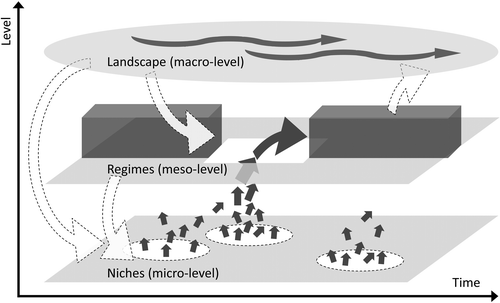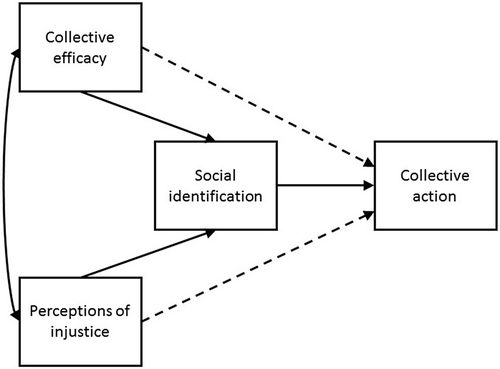Empowering People to Act for a Better Life for All
Psychology’s Contributions to a Social Science for Sustainability
Abstract
Abstract. The ongoing intensification of the socio-ecological crisis requires a “Great Transformation” (WBGU, 2011) of central societal systems involving aspects such as mobility, energy production, and nutrition. Thus, from a scientific point of view, the Great Transformation is a highly normative topic with a strong focus on societal and political processes of change. We are convinced that psychology can play a fruitful role in creating the social science for sustainability transformation that is needed for this purpose. However, for this to happen, psychology needs a shift toward a more impact-oriented research perspective, focusing on how people can effectively influence their ecological footprint and/or foster societal change as consumers, producers, or active citizens and community members. As starting points for developing such transformation-oriented psychological research perspectives, the present paper shows how a multilevel perspective on societal transformation processes can be combined with the vision of a solidarity-based lifestyle. Against this theoretical backdrop, we see an important role for psychology in studying how people cope with an ecological crisis by inventing new environmental lifestyles and identities, despite being locked into the currently unsustainable socio-technical systems.
The need for a Great Transformation toward sustainability (German Advisory Council on Global Change [WBGU], 2011, 2016) was recognized worldwide in the 2030 Agenda for Sustainable Development and the agreement on binding targets in Paris 2015 (United Nations Framework Convention in Climate Change [UNFCCC], 2015). One major target is the transformation of central, currently fossil-fuel-based socio-technical systems (e.g., mobility, energy production, housing, and nutrition) into fossil-free ones without endangering but rather promoting equality, inclusion, diversity, well-being, and quality of life for current and future generations (WBGU, 2019). In interdisciplinary sustainability research (e.g., Loorbach et al., 2017; Ockwell et al., 2009; Uzzell & Räthzel, 2009; Wittmayer et al., 2016), there is a consensus that this challenge requires transformations on multiple levels: from individuals to national and global politics, to cultural patterns and macroeconomics. However, a failure to address these socio-ecological challenges in a quick and effective way will result in further overstretching or even in the destruction of critical “global boundaries” (Rockström et al., 2009) with the consequence of hunger, poverty, flight, or even death for a growing number of people, especially in the Global South.
Against this backdrop, it is positive that the current, resource-depleting lifestyles are no longer seen as acceptable and that lifestyle change is urgently needed, particularly in the Global North (e.g., WBGU, 2011). However, some political and economic actors have a tendency to view such lifestyle changes as primarily the responsibility of the single individual – that is, some define these changes as mainly a problem of individual change in consumption behavior (e.g., buying green products, reducing the use of electricity). To correct this problematic approach, in recent years, a growing number of psychologists (e.g., Batel et al., 2016; Becker et al., 2020; Fritsche et al., 2018; Nielsen et al., 2021; Schulte et al., 2020; Upham et al., 2019) have stressed that individual changes in consumption behavior are necessary but not sufficient for solving the socio-ecological crisis. To make a substantive contribution to solving the socio-ecological crisis, psychology has to further develop its problem-solving potential. For this reason, the present paper focuses on discussing the following three, in this respect, promising research domains: (a) identifying the activities and the socio-psychological determinants that have the strongest impact on individuals’ ecological footprints (e.g., Moser & Kleinhückelkotten, 2018; Nielsen et al., 2021; Stern, 2000), (b) understanding how windows of opportunity arise for transforming the current, unsustainable, resistant socio-technical systems (e.g., mobility, energy production; Geels, 2002, 2012, 2018), and (c) how people – despite being “locked-in” to unsustainable socio-technical systems – invent new social identities (Bamberg et al., 2018; Schulte et al., 2020) and sustainable lifestyles in order to create a solidarity-based quality of life that is not only aimed at protecting the natural environment but also stresses societal justice and cooperation (Isham et al., 2019; WBGU, 2016, p. 133). These suggestions are not extensive but demonstrate that psychological research can contribute to the mitigation of the socio-ecological crisis and give insights into how this can be fruitful for further developing psychology as a society-relevant discipline.
Why a Stronger Focus on Behaviors With a Substantial Influence on the Ecological Footprint and Transformational Actions is Needed
For nearly 30 years, environmental psychology has focused on explaining pro-environmental intentions (intent) and behaviors (e.g., Bamberg & Möser, 2007; Gifford & Nilsson, 2014, Klöckner, 2013; Osbaldiston & Schott, 2012). This research tradition has applied and further developed theories on individual behavior change, values, and norms (Ajzen, 1991; Schwartz & Howard, 1981) to address socio-ecological challenges (Bamberg, 2013; Klöckner, 2013), resulting in growing knowledge about contextual factors that are relevant for behavior change and recommendations for developing interventions and policies to foster individual pro-environmental behavior in the private sphere (e.g., recycling, energy saving, organic food consumption, see, e.g., Klöckner, 2015). However, this approach has been criticized for years for being too narrow (Nielsen et al., 2021; Stern, 2000). It neglects not only behaviors that have a substantial impact on a person’s ecological footprint (e.g., investing in renewable energy) but also actions that drive the socio-ecological transformation (e.g., environmental citizenship and activism). There has been some psychological research on investments in renewable energy technologies, see, for example, the work by Wolske et al. (2017) and Kastner and Matthies (2016) or the work by Liu et al. (2019), on the acceptability of renewable energy projects. Recently, research on transformational behaviors in the public sphere has also been growing, such as the work by Bamberg et al. (2018), Wallis and Loy (2021), or Hamann and Reese (2020) on environmental activism. Despite these studies, in the overall context, psychological research on behaviors that have a substantial impact on mitigating the socio-ecological crisis is still rare.
The majority of psychological studies have focused on people’s motivation and intent, for instance, in the form of asking people about the extent to which they see themselves as a person whose actions are environmentally friendly (the environmental self-identity; Van der Werff et al., 2013, 2014). Meta-analyses and review studies have shown that measures of intent predict self-reported pro-environmental behavior in daily life (e.g., Bamberg & Möser, 2007; Geiger et al., 2019; Klöckner, 2013) and are correlated with the ecological footprint (impact) of people to varying degrees (Moser & Kleinhückelkotten, 2018). However, the predictive influence of intent (e.g., environmental self-identity) differs and is higher for behaviors with a lower impact, such as purchasing (more) organic foods, than for behaviors with a higher impact, such as predicting (lower) meat consumption or (fewer) car trips (Moser & Kleinhückelkotten, 2018). This shows that investigations of intentions to act pro-environmentally cannot be put on the same level by assuming that these people also have the scope of action for substantially influencing and reducing their CO2 emissions.
People with the same high pro-environmental intent can have very different scopes of action that will influence, for example, their CO2 emissions, depending on age, income, and other circumstances (Moser & Kleinhückelkotten, 2018). A higher income, for instance, strongly predicts a larger living space (which is correlated with a larger ecological footprint) but also investments in energy-efficient devices (which are correlated with a smaller ecological footprint). People in rural areas and older people use cars more often than people in cities (correlated with a larger ecological footprint), and older people tend to own a larger living space than younger people (Moser & Kleinhückelkotten, 2018). This raises the question of how to deal with these differences and how to empower people to more effectively bring their actions in line with their intent.
Sometimes very limited impact of people’s intentions and behavioral efforts on their ecological footprints indicates the strong restrictive effects the societal system has on individual behavior. This should remind us as psychologists that individual behaviors develop and exist within societal structures, and thus, behaviors both shape and are shaped by these societal structures (Schmitt et al., 2019; Uzzell & Räthzel, 2009).
In this context, it would be unfair to criticize psychology as being completely insensitive to the importance of contextual and social-system-related variables for understanding human behavior. Psychological action theories such as the theory of planned behavior (Ajzen, 1991) try to deal with this challenge by including concepts such as perceived behavioral control (Ajzen, 1991), which plays the theoretical role of reflecting the constraining or facilitating impact of contextual factors. Perceived behavioral control is based on a person’s perception and validation of contextual factors. It determines the effort and resources necessary for performing a specific behavior and is assumed to be an important direct as well as indirect – via intention – predictor of actual behavior (e.g., Armitage & Conner, 2001). However, when used alone, the concept of behavioral control is too narrow and abstract to adequately represent the impact of important objective societal framing conditions on individual behavioral intentions and behavior.
Roles for Researchers in Two Dimensions Ranging From Knowledge-First to Process-Oriented Sustainability Science
Despite psychologists’ efforts to consider contextual factors, most tend to refrain from integrating their behavior change research explicitly into a broader context of political and societal transformations. One reason for this might be the debate on the roles that researchers play in the context of socio-ecological transformations toward sustainability (Wittmayer & Schäpke, 2014). Most researchers studying socio-ecological challenges are confronted with (explicitly or implicitly) classifying their research as belonging to one of two dimensions: First, there is value-neutral science, which primarily provides knowledge and analyses. In the extreme, such a “knowledge-first scientist” (Wittmayer & Schäpke, 2014) refrains from making any evaluative statements or trying to attain social goals. The second dimension is transformative science, in which scientists take a self-reflexive perspective (e.g., Stirling, 2006) and express normative beliefs that can also change over a period of time. From our perspective, in a situation in which the question is how to deal with the socio-ecological crisis, the deficit of not explicitly embedding and reflecting the normative perspective and aims of research in a societal context becomes obvious: For example, the role attributed to psychology as the “behavior changer” has been rightly criticized by sustainability transitions research (Köhler et al., 2019; Shove, 2010). In the worst case scenario, a focus on behavior change in consumption that is not embedded in a larger transformational framework evokes the idea that structural changes and environmental regulations might be superfluous if only people would start buying green products, eating less meat, and driving and flying less. This view of people as merely consumers undermines the transformative power they can exert in roles as active members of communities, as citizens, and as activists. As a consequence, we believe that psychology has to deal more systematically with societal transformation processes and especially the roles that psychological factors play within these processes. Against the backdrop of more general social science theories of social transformation processes, psychological proposals on how individuals can contribute while playing the roles of consumers, investors, citizens, and activists may become more realistic. For this reason, the next sections present the multilevel perspective developed by Geels (2002, 2012, 2018) as a currently discussed theoretical framework from which to analyze the societal level of transformation processes. We use the presentation of the multilevel perspective as a starting point for a more systematic reflection of the place and contribution of psychological research within such a macro-theoretical framework.
The Multilevel Perspective as a Theoretical Framework of Societal Transformations
The multilevel perspective (MLP; Geels, 2005, 2012, 2018) views societal change as occurring through the transformation of so-called socio-technical systems. The term socio-technical indicates the complexity of such systems: They include technology, production capacities, supply networks, infrastructure, maintenance networks, legal regulation, cultural meaning, as well as user practices and markets (Geels, 2002). As the name implies, the MLP posits three analytical and heuristic levels on which processes interact and align to result in socio-technical system transformations:
- (1)The landscape (macro-level) describes exogenous developments such as the development of deep-seated cultural patterns, macro-politics, and economics or natural disasters. An example is climate change, but also economic crises, political upheaval, and other natural disasters (e.g., floods, droughts).
- (2)Regimes (meso-level) represent the current structures such as dominant rules, institutions, and technologies that are self-reinforcing. The socio-technical regime is dynamically stable along a predictable trajectory. Many products and industries are currently based on fossil fuels, and rules and institutions were developed for these industries. This makes the regime “locked-in” and resistant to both technological and social innovations toward sustainability.
- (3)Niches (micro-level) are the locus for radical innovations. Incubated from market and regulation influences, the niche fosters innovations that differ fundamentally from the prevailing regime and usually require landscape developments that open windows of opportunity on the regime level. Examples in the context of the climate crisis are people who pioneer innovations as producers and investors (e.g., alternatives to fossil fuels) and citizens and activists who call for new regulations and lifestyles.
The multilevel perspective argues that transformations of socio-technical systems come about through interactions between processes at these three levels: (a) niche innovations build up an internal momentum, through learning processes, price/performance improvements, and support from powerful groups, (b) changes at the landscape level create pressure on the regime, and (c) destabilization of the regime creates windows of opportunity for niche innovations. The alignment of these processes enables the breakthrough of novelties in mainstream markets where they compete with the existing regime. Figure 1 has become a somewhat standardized picture of this dynamic. An example of the application of the MLP is the German Energiewende (energy transition): Over decades, niche actors have developed innovations for pioneering activities in solar or wind power. The further development of this innovative technological approach into efficient large-scale technologies and the intensifying socio-ecological crises (at the landscape level) are putting pressure on the dominant socio-technical regimes (the traditional energy supplies) to establish new institutions and rules that support a transformation toward more sustainability. The intensifying socio-ecological crises have received attention from actors at the landscape level (an example is the Intergovernmental Panel on Climate Change [IPCC], 2018) but has been ignored by many others, pointing out the many interactions between and within the levels.

The Niche Concept as One Connecting Point of the MLP and Psychological Research
How can a psychological research program be located within the macro-theoretical MLP frame? As described above, one focus of the MLP is on niches as the loci of promising (but marginal) socio-technical innovations. However, the MLP itself has primarily addressed market-based innovations in technological systems. By extending niche innovation analyses into civil society contexts, Seyfang and Longhurst (2016) argued that grassroots innovation is a promising but neglected site of systems-changing innovation for sustainability. Seyfang and Smith (2007, p. 585) defined grassroots innovations as “innovative networks of activists and organizations that lead to bottom-up solutions for sustainable development; solutions that respond to the local situation and the interests and values of the communities involved.” Seyfang and Longhurst (2016) viewed grassroots innovations as central driving forces for the needed radical transformation of societal systems. This judgment is shared by other scientists who also concluded that grassroots organizations and citizen activism are “… the most efficient method of achieving emission reductions” (Rouser-Renouf et al., 2014, p. 163). Consequently, a better understanding of what leads people to become an active part of such initiatives and how to promote this kind of motivation may provide one innovative focus of an explicitly transformation-oriented research program for psychology.
Formation of a New Social Identity as an Environmental Activist – Contours of a Transition-Oriented Psychological Research Program
From a psychological point of view, the participation in grassroots innovation groups represents a prototypical example of collective action as “… any action undertaken by individuals as psychological group members to achieve group goals in a political context” (Van Zomeren, 2016, p. 89). Thus, the psychological research on collective action (e.g., Schulte et al., 2020; Van Zomeren et al., 2008) provides a starting point from which to understand the psychosocial factors underlying the decision to contribute more actively to the transformation of the current unsustainable socio-technical systems (i.e., becoming an environmental activist). Social identity has become the key concept for understanding collective action (Schulte et al., 2020) and is defined as the “part of an individual’s self-concept which derives from his knowledge of his membership of a social group (or groups) together with the emotional significance attached to that membership” (Tajfel, 1974, p. 69). Against this theoretical backdrop, it becomes crucial to understand how a new social identity (e.g., as an environmental activist) is formed. In their interactive model of social identity formation, Postmes et al. (2005, p. 747) assumed that their “inductive bottom-up route of identity formation” can explain this process. In essence, this approach postulates that in an intragroup context, a new social identity can be constructed through communication. With the encapsulated model of social identity in collective action (EMSICA; Figure 2), Thomas et al. (2009) developed a more formal model of the social identity formation process. The EMSICA anticipates that people will engage in collective actions when they experience motivating emotional reactions to injustice (anger or outrage) and simultaneously believe that group efforts can be successful (group efficacy; Bandura, 1997).

The inductive bottom-up route of identity formation and the related EMSICA also provide the theoretical basis for an intervention approach developed by McGarty and colleagues (Thomas & McGarty, 2009) to promote the formation of a new social identity. Inspired by Lewin’s (1947) famous early work on group decisions and food preferences, a group discussion forms the core of this intervention (see also Lewin, 1999). Our discussion of the social identity approach and the research programs stimulated by this approach should demonstrate the following: The concept of niches, introduced by the MLP, can stimulate the development of attractive transformation-oriented psychological research programs. Such research programs would simultaneously build a bridge between ambitious social psychological research and the general social science debate on a more adequate conceptualization and understanding of socio-technological systems that are moving in a carbon-free sustainable direction. Furthermore, such a research program has a strong practical impact: As discussed above, actively collaborating in the development of alternative societal structures is assumed to have a stronger transformative impact than buying green products.
The Concept of Solidarity-Based Lifestyles and Quality of Life as a Positive Vision for Transformation Processes
In adopting the MLP, whereas we have taken a systemic view that transcends psychology’s disciplinary boundaries, we now invite the reader to take a closer look at individuals and their well-being within the transformation process. System transformation in the sense of Geels (2002) includes phases of conflict between the old and the new regimes. Without question, the Great Transformation comes along with challenges for the individual that can be conceived of as threats and constraints on well-being (e.g., changes in natural and built environments, social changes, and new technologies). The consumption styles, in particular, of people in the Global North, are under pressure. Moral costs for many activities (e.g., leisure car use, flight travel) and monetary costs (e.g., for transport and energy) are increasing; upcoming regulations (e.g., for building new houses, insulating houses, or buying new cars) may be experienced as threatening. These changes have already led to conflicts in our societies (e.g., the gilets jaunes in France in 2019), which can be interpreted as results of a “locked-in” regime (Geels, 2002). From an MLP perspective, this resistance arises through rules, institutions, lobby groups, and conservative politics that were developed to support a system based on the use of fossil fuels. For years, psychologists such as Clayton et al. (2014) have pointed out the possible negative implications of this resistance on mental health, physical health, and community health. However, apart from researching the challenges to our lifestyles that come with the Great Transformation, psychology can also offer positive perspectives for change, and research may focus on resources that may help individuals cope with the challenges identified for their different roles (Nielsen et al., 2021). Thus, in collectively accepting our planet’s boundaries and limits of consumption, we see a chance of enhancing the quality of life of individuals (e.g., Jaeger-Erben & Matthies, 2014; WBGU, 2016).
The Great Transformation Offers More Than Curtailment – Why Not Focus on the Positive Aspects of Global Solidarity?
For years, positive psychology, health psychology, and community psychology have been empirically investigating the conditions that result in life satisfaction and well-being (Diener, 1984; Diener & Seligman, 2002; Gilster, 2012; Martela & Ryan, 2015; Reis et al., 2000; Ryan & Deci, 2000). A prominent finding has been that material resources are not the most important factor that influences life satisfaction (Aknin et al., 2009; Isham et al, 2019) and that spending money on other people results in greater happiness for the giver (Dunn et al., 2008). Autonomy, competence, and relatedness have been identified as further conditions for well-being (see Reis et al., 2000). We know from stress psychology that the experience of collectively acting and helping each other can be a resource for coping with loss and critical life events (Fletcher & Sarkar, 2013). These findings are a good starting point for the closer investigation of the possible positive effects of the many forms of engaging in sustainability-relevant behaviors.
Identifying with the aim of sustainable development and acting to reach the goal of a more sustainable society also implies taking action for general fairness and better living conditions for all people (World Commission on Environment and Development [WCED], 1987). Thus, these actions as such could have a positive effect on the generation of life satisfaction, considering, for instance, that social equality promotes life satisfaction. Also, the acceptance of limitations is potentially influenced by a social value orientation. We suggest the concept of solidarity-based quality of life as an appropriate umbrella term for the positive implications of acting as supporters of the Great Transformation in the role of consumers as well as citizens. Solidarity stresses the overarching aim of sustainable development, which is justice and not only environmental protection. Solidarity-based quality of life refers to the resources and positive implications that can be expected from such actions and orientations. As the overall aim is global and complex, it also implies that the process has to mature and needs constant evaluation and adjustments. This requires an outcome orientation and a vision that may empower individuals and bridges the gap between intent and impact, such as a psychologically-based vision that revolves around quality of life (Matthies, 2018; WBGU, 2016).
What Research Questions Does the Psychology of a Solidarity-Based Lifestyle Focus on?
The concept of a solidarity-based quality of life can be related to all types of environmentally significant behaviors described by Stern (2000) and thus also to the different roles people may play as consumers, investors, producers, members of communities, citizens, and activists (Nielsen et al., 2021). Nevertheless, this concept has implications beyond Stern’s (2000) understanding of environmentally significant behaviors. It leads to the consideration of new categories of behavior (e.g., forms of support such as donating or becoming an agent of change) and motivates research into the relation of the several forms of behaviors that are oriented toward the Great Transformation to sustainable development. Finally, it motivates research on the relationship between environmental concern for sustainable development and new kinds of knowledge about the consequences of individual behaviors (e.g., an individual’s carbon footprint), about the efficacy of political measures, and potential effects on quality of life and well-being.
We, therefore, see several implications for research. On a first level, the approach invites the integration of possible positive effects of behaviors that support individual well-being in the several theories of behavior change that have been applied to topics of the Great Transformation. This also calls for research on measuring the possible positive effects (e.g., sense of coherence, developing and enhancing social ties) of broadening an individual’s opportunities to transcend societal challenges and for the development or adoption of psychometric instruments to measure those outcomes.
On a second level, the approach calls for research that will focus on new forms of behavior change (e.g., the previously neglected collective actions, support of niche activities) and more generally the motivation to become interested and involved in a variety of possible ways to change individually or collectively, and in trying out new behaviors. On this level, research into the relations of the various behaviors also becomes more relevant than spillover research has been.
Finally, on a third level, it calls for research into the experience of being effective with respect to the complex aim of social justice. We have to become interested in subjective scopes of action and appropriate ways to offer information about the consequences of individual behavior. This might also touch upon the topic of new forms of knowledge presentation, new forms of learning, and trust in institutions.
For this kind of research on the solidarity-based quality of life, we already see several starting points, for example, research on the spillover between private-sphere behaviors and the acceptance of measures (Steinhorst & Matthies, 2016; Thøgersen & Noblet, 2012) or research on collective efficacy (Hamann & Reese, 2020). The link to the concept of social identification has already been explored in more detail. However, embedded in the concept of a Great Transformation, we might think of more exploratory research approaches that are able to address the multiple new practices that have been developed in recent years, for example, what kinds of new practices (e.g., sharing, collectively trying out radical changes) or interventions (neighborhood energy competitions) have the potential to activate further positive experiences? What does newness offer to individuals (a new style of nutrition, a radical change in diets, in consumption styles)? How can the development of new collective practices be supported, and how can positive aspects (social connectedness, self-efficacy) be measured and negative aspects be addressed?
Conclusion
For decades, the analysis of the psychological mechanisms underlying unsustainable behaviors as well as their movement in more sustainable directions has been an important topic in applied psychology. This includes behavioral research on factors that influence behaviors that are good for the environment and the climate as well as behaviors that promote health and well-being or more generally attempt to empower people to create a better quality of life for them. However, currently, skepticism is increasing with respect to the question of whether the traditional psychological research strategy for dealing with this issue is still adequate. There is more and more evidence that this research is failing to focus on the relevant, impactful behaviors. Confronted with the intensifying socio-ecological crisis, a focus on only the factors that motivate people to become “green consumers” is too narrow. The aim of our paper is to contribute to a common process for searching for a more adequate contribution of psychological research to how society can effectively cope with the environmental crisis. As discussed, we are convinced that such a strategy must be characterized by the following two features: It has to be transformation-oriented and truly interdisciplinary. Concerning the first characteristic – transformation-oriented – we see great potential for psychology to explore the kind of visions/utopias that will motivate people to desire transformative societal change or will at least reduce their fear of such change. More precisely, we propose the concept of a solidarity-based quality of life as such a vision/utopia. This concept focuses less on the losses and sacrifices that are always associated with transformative change and more on the transformative change as a source of positive experiences and emotions. For us, it would be a fascinating task for psychology to research which kinds of new practices and lifestyles have the potential to activate positive experiences and emotions. Simultaneously, the focus on well-being and quality of life would bring together a range of currently unconnected psychological research traditions under the umbrella of solving the socio-ecological crisis. A more intensive reception and exchange with positive psychology, health psychology, and community psychology may provide a helpful starting point for developing concrete research programs.
We are also convinced that without a stricter interdisciplinary orientation, there is the danger that psychology will isolate itself with the consequence that other disciplines such as climate science, engineering, sociology, and political science may no longer view psychology as an important part of the scientific enterprise of developing pathways to a more sustainable future for society. From our point of view, being able to make an impactful contribution to this enterprise requires psychology to develop a greater interest in the political and societal processes that are necessary for creating environments that facilitate sustainable behavioral options. Examples of such environments are better infrastructures in cities for cycling, walking, and public transport, intensive support for environmental and democratic activities of citizens, and accompanying measures that support investments in a low-carbon society. The exchange with the more “macro”-oriented disciplines such as sociology, political science, and economics has the potential to widen our horizon and help psychology develop more impactful research programs.
Furthermore, clarifying the role that psychological processes play within such macro-theoretical frameworks has the potential to stimulate new lines of research within psychology. Examples are frameworks that consider the role of politics and institutions (e.g., Paris agreement) for creating windows of opportunities for niche agents of change (e.g., environmental activists). As demonstrated above, using the MLP as such a macro-theoretical framework centers our interest on the niche concept and the role of grassroots innovations. We showed the kind of fascinating research questions this focus may open. We are convinced that by contributing to the understanding of how people develop a new social identity as an active supporter of the Great Transformation toward sustainability, psychology will simultaneously make a significant contribution toward promoting such societal change.
To summarize, from our point of view, the combination of the two lines of research – exploring the kinds of visions/utopias that motivate people to desire transformative societal change and to understand the processes that underlie the formation of a new “transformative” social identity – has the potential to create fascinating and impactful psychological research that will help society cope with solving the socio-ecological crisis.
Hannah Wallis (PhD) is a postdoctoral researcher in the Department of Environmental Psychology at the Otto von Guericke University Magdeburg. She examines pro-environmental decisions and behaviors in particular of adolescents and young people, in areas such as energy saving and pro-environmental activism.

Sebastian Bamberg (PhD) is a Professor of social psychology and quantitative research methods at the University of Applied Science Bielefeld. His research focuses on attitude-behavior models, behavioral change theories, and social identity theory. He develops theory-driven intervention and evaluation methods related to sustainability transformation in areas as mobility, resilience, and environmental activism.

Maxie Schulte is a doctoral researcher at the University of Applied Science Bielefeld. Her research focuses on processes of change, social identity theory, and collective pro-environmental behavior.

Ellen Matthies (PhD) is a Professor of environmental psychology in the Department of Environmental Psychology at the Otto von Guericke University Magdeburg. Her research field is human-environment-interaction and behaviors and decisions in areas as quality of life, energy use, and mobility. She develops theory-based evaluation and intervention measures related to sustainability transformation.

References
(1991). The theory of planned behavior. Organizational Behavior and Human Decision Processes, 50(2), 179–211. https://doi.org/10.1016/0749-5978(91)90020-T
(2009). From wealth to well-being? Money matters, but less than people think. British Journal of Social Psychology, 4(6), 523–527. https://doi.org/10.1080/17439760903271421
(2001). Efficacy of the theory of planned behaviour: A meta‐analytic review. British Journal of Social Psychology, 40(4), 471–499. https://doi.org/10.1348/014466601164939
(2013). Changing environmentally harmful behaviors: A stage model of self-regulated behavioral change. Journal of Environmental Psychology, 34, 151–159. https://doi.org/10.1016/j.jenvp.2013.01.002
(2007). Twenty years after Hines, Hungerford, and Tomera: A new meta-analysis of psycho-social determinants of pro-environmental behaviour. Journal of Environmental Psychology, 27(1), 14–25. https://doi.org/10.1016/j.jenvp.2006.12.002
(2018).
Environmental protection through societal change: What psychology knows about collective climate action – and what it needs to find out . In S. ClaytonC. ManningEds., Psychology and Climate Change: Human Perceptions, Impacts, and Responses (pp. 185–213). Academic Press. https://doi.org/10.1016/B978-0-12-813130-5.00008-4(1997). Self-efficacy: The exercise of control. H. Freeman.
(2016). Developing a critical agenda to understand pro‐environmental actions: contributions from Social Representations and Social Practices Theories. Wiley Interdisciplinary Reviews: Climate Change, 7(5), 727–745. https://doi.org/10.1002/wcc.417
(2020). The role of social identity in institutional work for sociotechnical transitions: The case of transport infrastructure in Berlin. Technological Forecasting and Social Change, 162, Article 120385. https://doi.org/10.1016/j.techfore.2020.120385
(2014). Beyond storms & droughts: The psychological impacts of climate change. American Psychological Association and ecoAmerica. https://ecoamerica.org/wp-content/uploads/2014/06/eA_Beyond_Storms_and_Droughts_Psych_Impacts_of_Climate_Change.pdf
(1984). Subjective well-being. Psychological Bulletin, 95(3), 542–575. https://doi.org/10.1037/0033-2909.95.3.542
(2002). Very happy people. Psychological Science, 13(1), 81–84. https://doi.org/10.1111/1467-9280.00415
(2008). Spending money on others promotes happiness. Science, 319(5870), 1687–1688. https://doi.org/10.1126/science.1150952
(2013). Psychological resilience: A review and critique of definitions, concepts, and theory. European Psychologist, 18(1), 12–23. https://doi.org/10.1027/1016-9040/a000124
(2018). A social identity model of pro-environmental action (SIMPEA). Psychological Review, 125(2), 245–269. https://doi.org/10.1037/rev0000090
(2002). Technological transitions as evolutionary reconfiguration processes: A multi-level perspective and a case study. Research Policy, 31(8–9), 1257–1274. https://doi.org/10.1016/S0048-7333(02)00062-8
(2005). Technological transitions and system innovations: A co-evolutionary and socio-technical Analysis. Edward Elgar Publishing.
(2012). A socio-technical analysis of low-carbon transitions: Introducing the multi-level perspective into transport studies. Journal of Transport Geography, 24, 471–482. https://doi.org/10.1016/j.jtrangeo.2012.01.021
(2018). Disruption and low-carbon system transformation: Progress and new challenges in socio-technical transitions research and the Multi-Level Perspective. Energy Research & Social Science, 37, 224–231. https://doi.org/10.1016/j.erss.2017.10.010
(2019). A meta-analysis of factors related to recycling. Journal of Environmental Psychology, 64, 78–97.
. (2011). World in transition: A social contract for sustainability [Flagship Report]. WBGU. https://issuu.com/wbgu/docs/wbgu_jg2011_en?e=37591641/69400200
. (2016). Humanity on the move: Unlocking the transformative power of cities [Flagship Report]. WBGU. https://issuu.com/wbgu/docs/hg2016_en_highres?e=37591641/68733616
. (2019). Towards Our Common Digital Future [Flagship Report]. WBGU. https://issuu.com/wbgu/docs/wbgu_hg2019_en?fr=sM2QyYzU1OTI4OA
(2014). Personal and social factors that influence pro-environmental concern and behavior: A review. International Journal of Psychology, 49(3), 141–157. https://doi.org/10.1002/ijop.12034
(2012). Comparing neighborhood‐focused activism and volunteerism: Psychological well‐being and social connectedness. Journal of Community Psychology, 40(7), 769–784. https://doi.org/10.1002/jcop.20528
(2020). My influence on the world (of others): Goal efficacy beliefs and efficacy affect predict private, public, and activist pro‐environmental behavior. Journal of Social Issues, 76(1), 35–53. https://doi.org/10.1111/josi.12369
. (2018). Global warming of 1.5 °C: An IPCC Special Report on the impacts of global warming of 1.5 °C above pre-industrial levels and related global greenhouse gas emission pathways, in the context of strengthening the global response to the threat of climate change, sustainable development, and efforts to eradicate poverty. IPCC. https://www.ipcc.ch/site/assets/uploads/sites/2/2019/05/SR15_SPM_version_stand_alone_HR.pdf
(2019). Flow activities as a route to living well with less. Environment and Behavior, 51(4), 431–461. https://doi.org/10.1177/0013916518799826
(2014). Urbanisierung und Nachhaltigkeit: Umweltpsychologische Perspektiven auf Ansatzpunkte, Potentiale und Herausforderungen für eine nachhaltige Stadtentwicklung
[Urbanization and sustainability: A perspective of environmental psychology for approaches, potentials and challenges of a city′s sustained transformation] . Umweltpsychologie, 18(2), 10–30. https://www.umweltbundesamt.de/sites/default/files/medien/371/dokumente/umps_urbanisierung_nachhaltigkeit_14_02_10-30.pdf(2016). Investments in renewable energies by German households: A matter of economics, social influences and ecological concern? Energy Research & Social Science, 17, 1–9. https://doi.org/10.1016/j.erss.2016.03.006
(2013). A comprehensive model of the psychology of environmental behaviour: A meta-analysis. Global Environmental Change, 23(5), 1028–1038. https://doi.org/10.1016/j.gloenvcha.2013.05.014
(2015). The psychology of pro-environmental communication: Beyond standard information strategies. Palgrave Macmillan. https://doi.org/10.1057/9781137348326
(2019). An agenda for sustainability transitions research: State of the art and future directions. Environmental Innovation and Societal Transitions, 31, 1–32. https://doi.org/10.1016/j.eist.2019.01.004
(1999).
Group decision and social change . In M. GoldEd., The complete social scientist: A Kurt Lewin reader (pp. 265–284). American Psychological Association. (Reprinted from Readings in Social Psychology, pp. 330–341, by T. M. Newcomb & E. L. Hartley, Eds., 1947, Henry Holt). https://doi.org/10.1037/10319-010(1947). Group decision and social change. Holt, Rinehart & Winston.
(2019). Effects of trust and public participation on acceptability of renewable energy projects in the Netherlands and China. Energy Research & Social Science, 53, 137–144. https://doi.org/10.1016/j.erss.2019.03.006
(2017). Sustainability transitions research: transforming science and practice for societal change. Annual Review of Environment and Resources, 42, 599–626.
(2015). The benefits of benevolence: Basic psychological needs, beneficence, and the enhancement of well‐being. Journal of personality, 84(6), 750–764. https://doi.org/10.1111/jopy.12215
(2018). Wenn 80% ihren Lebensstil ändern, ist dann die Große Transformation gelungen? Überlegungen zur transformativen Rolle der Umweltpsychologie
[If 80% changed their lifestyle would the great transformation be succeeded? Deliberations on the transformative role of the environmental psychology] . Umweltpsychologie, 22(1), 131–138.(2018). Good intents, but low impacts: Diverging importance of motivational and socioeconomic determinants explaining pro-environmental behavior, energy use, and carbon footprint. Environment and Behavior, 50(6), 626–656. https://doi.org/10.1177/0013916517710685
(2021). How psychology can help limit climate change. American Psychologist, 76(1), 130–144. https://doi.org/10.1037/amp0000624
(2009). Reorienting climate change communication for effective mitigation: forcing people to be green or fostering grass-roots engagement? Science Communication, 30(3), 305–327. https://doi.org/10.1177/1075547008328969
(2012). Environmental sustainability and behavioral science: Meta-analysis of proenvironmental behavior experiments. Environment and Behavior, 44(2), 257–299. https://doi.org/10.1177/0013916511402673
(2005). Individuality and social influence in groups: Inductive and deductive routes to group identity. Journal of Personality and Social Psychology, 89(5), 747–763. https://doi.org/10.1037/0022-3514.89.5.747
(2000). Daily well-being: The role of autonomy, competence, and relatedness. Personality and Social Psychology Bulletin, 26(4), 419–435. https://doi.org/10.1177/0146167200266002
(2009). A safe operating space for humanity. Nature, 461, 472–475. https://doi.org/10.1038/461472a
(2014). The genesis of climate change activism: From key beliefs to political action. Climatic Change, 125(2), 163–178. https://doi.org/10.1007/s10584-014-1173-5
(2000). Self-determination theory and the facilitation of intrinsic motivation, social development, and well-being. American Psychologist, 55(1), 68–78. https://doi.org/10.1037110003-066X.55.1.68
(2019). What predicts environmental activism? The roles of identification with nature and politicized environmental identity. Journal of Environmental Psychology, 61, 20–29. https://doi.org/10.1016/j.jenvp.2018.11.003
(2020). Social identity as a key concept for connecting transformative societal change with individual environmental activism. Journal of Environmental Psychology, 72, Article 101525. https://doi.org/10.1016/j.jenvp.2020.101525
(1981).
A normative decision-making model of altruism . In J. P. RushtonR. M. SorrentinoEds., Altruism and helping behavior (pp. 189–211). Erlbaum.(2016). What influences the diffusion of grassroots innovations for sustainability? Investigating community currency niches. Technology Analysis & Strategic Management, 28(1), 1–23. https://doi.org/10.1080/09537325.2015.1063603
(2007). Grassroots innovations for sustainable development: Towards a new research and policy agenda. Environmental Politics, 16(4), 584–603. https://doi.org/10.1080/09644010701419121
(2010). Beyond the ABC: Climate change policy and theories of social change. Environment and Planning A: Economy and Space, 42(6), 1273–1285. https://doi.org/10.1068/a42282
(2016). Monetary or environmental appeals for saving electricity? Potentials for spillover on low carbon policy acceptability. Energy Policy, 93, 335–344. https://doi.org/10.1016/j.enpol.2016.03.020
(2000). Toward a coherent theory of environmentally significant behavior. Journal of Social Issues, 56(3), 407–424. https://doi.org/10.1111/0022-4537.00175
(2006).
Precaution, foresight and sustainability: Reflection and reflexivity in the governance of science and technology . In J. P. VossD. BauknechtR. KempEds., Reflexive governance for sustainable development (pp. 225–272). Edward Elgar.(1974). Social identity and intergroup behaviour. Social Science Information, 13(2), 65–93. https://doi.org/10.1177/053901847401300204
(2012). Does green consumerism increase the acceptance of wind power? Energy Policy, 51, 854–862. https://doi.org/10.1016/j.enpol.2012.09.044
(2009). The role of efficacy and moral outrage norms in creating the potential for international development activism through group‐based interaction. British Journal of Social Psychology, 48(1), 115–134. https://doi.org/10.1348/014466608X313774
(2009). Aligning identities, emotions, and beliefs to create commitment to sustainable social and political action. Personality and Social Psychology Review, 13(3), 194–218. https://doi.org/10.1177/1088868309341563
. (2015, November 30–December 11). Adoption of the Paris agreement. [Conference Session]. Conference of the Parties, Paris, France. https://unfccc.int/resource/docs/2015/cop21/eng/l09r01.pdf
(2019). Energy transitions and social psychology: A sociotechnical perspective. Routledge.
(2009). Transforming environmental psychology. Journal of Environmental Psychology, 29(3), 340–350. https://doi.org/10.1016/j.jenvp.2008.11.005
(2013). The value of environmental self-identity: The relationship between biospheric values, environmental self-identity and environmental preferences, intentions and behaviour. Journal of Environmental Psychology, 34, 55–63. https://doi.org/10.1016/j.jenvp.2012.12.006
(2014). I am what I am, by looking past the present: The influence of biospheric values and past behavior on environmental self-identity. Environment and Behavior, 46(5), 626–657. https://doi.org/10.1177/0013916512475209
(2016). Building a Tower of Babel? Integrating core motivations and features of social structure into the political psychology of political action. Political Psychology, 37, 87–114. https://doi.org/10.1111/pops.12322
(2008). Toward an integrative social identity model of collective action: A quantitative research synthesis of three socio-psychological perspectives. Psychological Bulletin, 134, 504–535. https://doi.org/10.1037/0033-2909.134.4.504
(2021). What drives pro-environmental activism of young people? A survey study on the Fridays for future movement. Journal of Environmental Psychology, https://doi.org/10.1016/j.jenvp.2021.101581
(2014). Action, research and participation: roles of researchers in sustainability transitions. Sustainability Science, 9(4), 483–496. https://doi.org/10.1007/s11625-014-0258-4
(2016). Governing sustainability: A dialogue between local agenda 21 and transition management. Local Environment, 21(8), 939–955. https://doi.org/10.1080/13549839.2015.1050658
. (1987). Report of the World Commission on Environment and Development: Our common future. UN. https://sustainabledevelopment.un.org/content/documents/5987our-common-future.pdf
(2017). Explaining interest in adopting residential solar photovoltaic systems in the United States: Toward an integration of behavioral theories. Energy Research & Social Science, 25, 134–151. https://doi.org/10.1016/j.erss.2016.12.023



